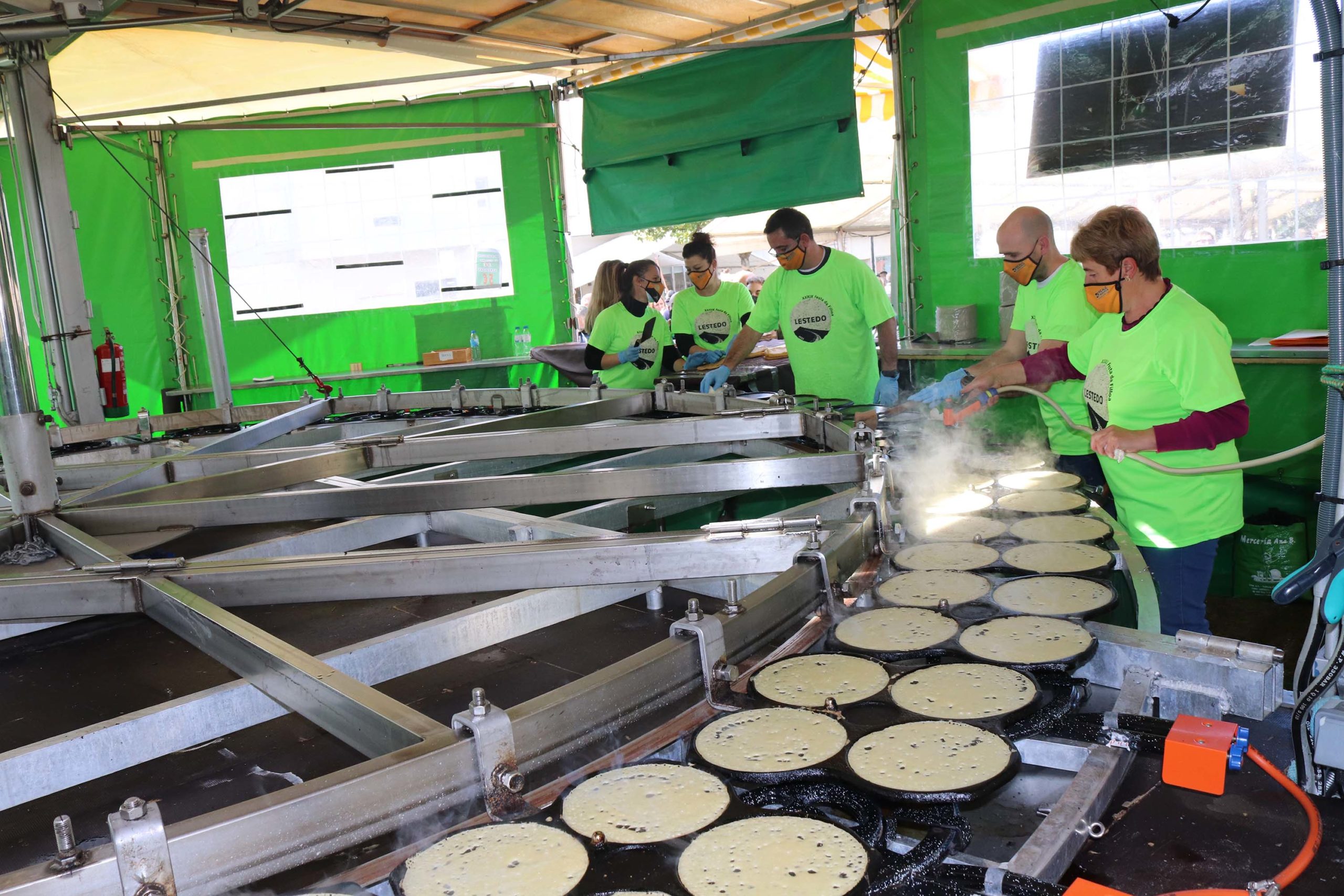Thousands of visitors are enjoying in Boqueixón the 29th Filloa de Lestedo Festival and the event featuring the Xenerais da Ulla (Generals of the Ulla), after missing last year due to the pandemic. The event is being held with all the safety measures in force, as was pointed out by the Regional Sea Minister, Rosa Quintana, who praised the “responsibility” of those present by “keeping their face masks on despite it not being compulsory to do so in open spaces.”
This year’s festival is a little different from previous ones, especially due to the lack of traditional tastings of “filloas” cooked on a stone and with different fillings. In this regard, a large “filloa”-making machine called a filloeira, which can make up to 1,500 “filloas” per hour, was used to satisfy this year’s demand for Lestedo “filloas.” Judging by the queues that formed during the Xenerais event, these Galician crepes were in great demand, so much so that the queue went all around the square.
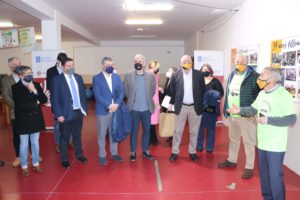
Music groups of the “Mestre Manuel Gacio” Cultural Association livened up the day with music, accompanied by “filloas,” octopus stands, children’s amusements, food trucks, and cake stands. Moreover, starting at 11 am, Lestedo’s social hall hosted the photography exhibition entitled “39 years making filloas,” organised by the Lestedo residents’ association, which was grateful for the support received not only from locals but also the newspapers La Voz de Galicia Santiago and El Correo Gallego, which provided some of the images.
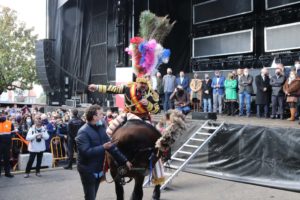
“Atranques” of the Xenerais da Ulla
The photography exhibition was opened by Boqueixón’s mayor, Manuel Fernández Munín, who led a numerous official party made up of the Regional Sea Minister, Rosa Quintana Carballo; the Regional Health Minister, Julio García Comesaña; the director of Galicia Tourism, Nava Castro; the secretary general for Linguistic Policy, Valentín García; the member of the Galician Parliament, Ovidio Rodeiro Tato; the Provincial Council’s Economic Promotion representative and mayor of Ames, Blas García Piñeiro; and Xosé Manuel Lobato, the writer and presenter of this year’s opening speech. Also present were the mayors of Vedra and Touro, Carlos Martínez and Ignacio Codesido, as well as some local town councillors.
After welcoming those in attendance, the presenter María Mera introduced the “Gran Alto” event featuring the Xenerais da Ulla, which was held this year in the morning rather than in the afternoon, without the traditional parade around Lestedo’s streets due to the COVID-19 pandic. There were four “atranques” (satirical display) in the fairground, starting with Aroa Estévez and Andrés Lare with an amusing “atranque” for children. This was followed by four more, featuring numerous references to current affairs, especially those involving the crisis in Ukraine and the politician Pablo Casado. The “atranques” featured: Gonzalo Ferreiroa and Olaia Canabal; Xulián Vázquez and José Canabal; and Uxía Cabanal and Esteban Estévez.
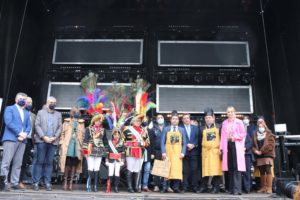
Objective: Festival of National Interest
The “atranques” were followed by speeches by the authorities. Fernández Munín thanked Lestedo’s residents for their work “since it is hard enough to organise a Festival of Galician Tourist Interest like this one for 39 years; this year was even more complicated due to the short notice that was given to start it up.” He also praised the filloa “as a delicacy that can be eaten all year round, not only at Carnival time,” highlighting that “we were pioneers in this gastronomic celebration in Galicia and now we have to continue working, all of us together, to keep on growing.”
A commitment mentioned by the director of Galicia Tourism, Nava Castro, who underlined the importance of festivals like this one and the Xenerais da Ulla event for the tourist promotion of Galicia. She also challenged those in attendance: “with the work of all of us, with our products, and with this great Carnival tradition, now we have to climb another step and strive to become a Festival of National Tourism Interest.”
Appreciation for local residents
The president of the “Filloa” Cultural Association, José Manuel Canabal, also expressed appreciation for the “fine work, involvement, and dedication on the part of Lestedo’s residents. Two months ago, I’m sure nobody thought that we’d be here today. But we managed it, thanks to the locals’ work, efforts, involvement, and enthusiasm, as well as the work of the members of the “Filloa” Cultural Association.”
The member of the provincial council, Blas García, highlighted the value of the Lestedo “filloa” and emphasised that this celebration promotes the local cuisine, generating wealth but also serving as a means for creating new links of harmony and socialisation among the locals.” Finally, Ovidio Rodeiro agreed that the work of Lestedo’s residents “managed to place this town, this parish, in one of the most important places in the sphere of Galician food festivals.”
Health and “Filloa”
The writer and teacher Xosé Manuel Lobato, born in Lestedo, was in charge of delivering a very literary opening speech in which he read several texts by writers such as Castelao or Neira Vilas. He also highlighted the work of the filloeiras (“filloa” cooks) in the parish of Lestedo, who “produced the best version of a nutrient that lets itself be imprisoned with the passion with which it is made.” A “filloa” made up of “water from the sacred fountain of Pico Sacro, oil, and husk from Boqueixón. A union with wisdom passed down from generation to generation. Commitment to the best version of a matchless filloa.”
In this regard, Lobato declared that “in Lestedo, it’s a devotion to savour culture and tradition. Also a blessing that has no side effects,” wishing all those present: “health and filloa!”
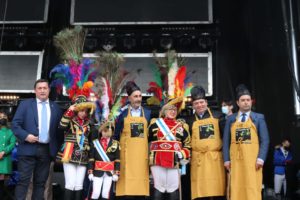
Awards
Before the vermouth session featuring the Olympus orchestra, the Aprons of Honour of the 2022 “Filloa” Festival were awarded to Xosé Manuel Lobato himself; Víctor Furelos, the journalist in charge of Local News in El Correo Gallego; and Ramiro Esparís Sampedro, director of the CIFP Compostela centre.
The event ended with a special mention for the xenerais and xeneralas da Ulla, in which José Manuel Canabal awarded the “Xenerala da Filloa 2022” prize to Uxía Canabal Peón, who ended by saying: “long live the 39th Filloa de Lestedo Festival! Long live the people that accompany, admire, and surround us! Long live our union!”
The Finisterre and Olympus orchestras rounded off the programme of activities with a traditional open-air dance.
